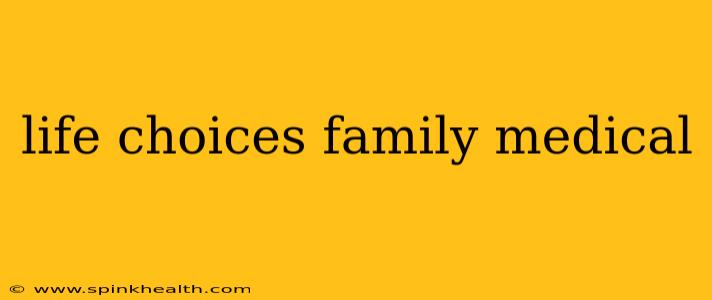Life Choices and Family Medical History: A Story of Intertwined Destinies
Life. It's a tapestry woven with threads of chance and choice, a narrative shaped by the decisions we make each day. But what about the threads we inherit? Our family medical history, a legacy passed down through generations, profoundly influences the choices we make regarding our health and well-being. It's a story I know well, a story that started with my grandmother, Nana Rose.
Nana Rose was a vibrant woman, full of life and laughter. But her life was tragically cut short by a heart attack at the relatively young age of 55. This event cast a long shadow over our family, not just because of the grief, but because it ignited a conversation about hereditary heart disease. Suddenly, the seemingly random choices we make every day—what we eat, how much we exercise, whether we smoke—took on a new, urgent significance.
My own journey with this awareness began with a simple blood test. I was relatively young, healthy, and didn't have any significant symptoms. However, knowing my family's history, I proactively sought out genetic testing and regular checkups. The results confirmed a predisposition to high cholesterol, a risk factor significantly increased by my family history. This knowledge wasn't a death sentence; instead, it armed me with crucial information, empowering me to make informed choices.
How Does Family Medical History Impact Life Choices?
This question sits at the heart of my story, and countless others. Our family medical history provides a roadmap, highlighting potential health challenges we may face. Understanding this roadmap allows for proactive, preventative measures, transforming reactive healthcare into a more proactive approach. It's about taking control of your destiny.
What are the most common hereditary medical conditions?
Many conditions are passed down through families. Heart disease, as in my family's case, is a common one. Others include certain types of cancer (breast, colon, ovarian), diabetes, high blood pressure, mental health conditions, and various autoimmune disorders. It’s important to remember that having a family history doesn't guarantee you'll develop the condition, but it significantly increases your risk.
Can lifestyle choices mitigate hereditary risks?
Absolutely! This is where the power of choice comes in. While you can’t change your genes, you can significantly influence your health outcomes through lifestyle choices. A healthy diet rich in fruits, vegetables, and whole grains, regular exercise, maintaining a healthy weight, avoiding smoking and excessive alcohol consumption, and managing stress are all crucial steps. These lifestyle modifications can often significantly reduce the risk of developing hereditary conditions.
How can I learn more about my family's medical history?
Talking to family members is the first and most important step. Gathering information about their health conditions, ages at diagnosis, and any significant family history can be incredibly valuable. Consider creating a family health tree, a visual representation that can help you track patterns and identify potential risks. You can also consult with your doctor or a genetic counselor, who can provide guidance and further testing if needed.
What tests are available to assess hereditary risks?
Genetic testing plays an increasingly important role in identifying genetic predispositions to various diseases. These tests can analyze your DNA to identify specific genes associated with an increased risk of certain conditions. Your doctor can help determine if genetic testing is appropriate for you based on your family history and personal risk factors.
Should I disclose my family medical history to my doctor?
Yes, absolutely! Your family medical history is crucial information for your doctor. It helps them understand your risk profile, personalize your care, and recommend appropriate screenings and preventative measures. Open communication with your healthcare provider is key to proactive health management.
My journey with my family's medical history has taught me the profound interplay between inherited predispositions and personal choices. It's a narrative that continues to unfold, a testament to the resilience of the human spirit and the power of informed decision-making. While we cannot rewrite our family's story, we can write our own, making choices today that shape a healthier, happier tomorrow. The thread of family history might be given, but how we weave it into the larger tapestry of our lives, that is entirely up to us.

